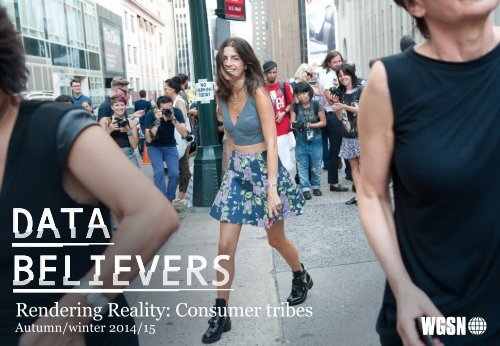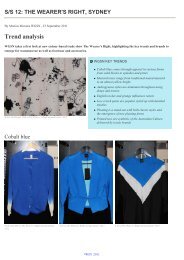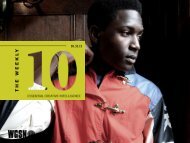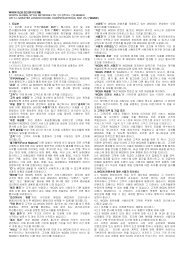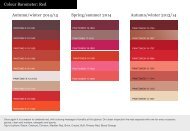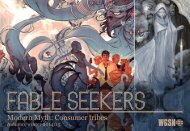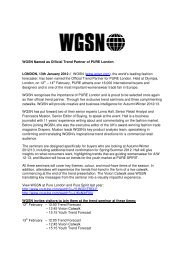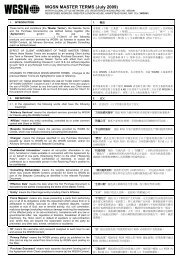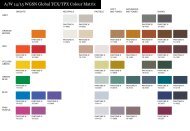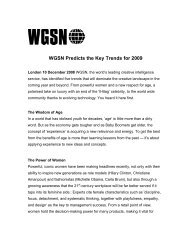Rendering Reality: Consumer tribes - WGSN
Rendering Reality: Consumer tribes - WGSN
Rendering Reality: Consumer tribes - WGSN
You also want an ePaper? Increase the reach of your titles
YUMPU automatically turns print PDFs into web optimized ePapers that Google loves.
<strong>Rendering</strong> <strong>Reality</strong>: <strong>Consumer</strong> <strong>tribes</strong><br />
Autumn/winter 2014/15
<strong>Rendering</strong> <strong>Reality</strong><br />
The tribe associated with the <strong>Rendering</strong> <strong>Reality</strong> trend is called Data<br />
Believers. They believe in the truth of statistics and are beginning<br />
to track information about themselves, particularly in the field of<br />
health and wellness. They are pragmatic and seek to take control of<br />
all the informational trails left behind them and make practical use<br />
of this intelligence.
Research & Reference<br />
Quantified self<br />
Goal-oriented<br />
Civic-minded<br />
Learning<br />
Control<br />
New identities
Quantified self<br />
A growing number of consumers are beginning to see the advantages of tracking and taking control of their own data.<br />
“We’re moving towards a time when the ability to track and understand data is deeply woven into our daily lives,” says Ernesto Ramirez, community organiser for<br />
Quantified Self, the organisation created by Kevin Kelly of Wired and Gary Wolf. www.mashable.com, October 2012
Quantified self<br />
“Most people do not routinely record their moods, sleeping patterns or activity levels, track how much alcohol or caffeine they drink or chart how often they walk the<br />
dog. But some people are doing just these things. They are an eclectic mix of early adopters, fitness freaks, technology evangelists, personal-development junkies,<br />
hackers and patients suffering from a wide variety of health problems. Self-tracking may look geeky now, but the same was once true of email. And what geeks do<br />
today, the rest of us often end up doing tomorrow.” www.economist.com, May 2012
Goal-oriented<br />
This ability to track and quantify ourselves is increasing consumer interest in goal-oriented products and solutions.<br />
Nowadays, people are declaring their daily goals and intentions to peers and seeking their support via social media. Companies such as Gympact and StickK operate<br />
on accountability-based influence (ABI), a scenario in which you're judged on your actions versus your words.
Goal-oriented<br />
“Beeminder, a ‘motivational tool that puts your money where your mouth is,’ falls into this category too, according to co-founders Daniel Reeves and Bethany Soule.<br />
Users quantify a goal and pledge to pay money to Beeminder if they fall off the wagon.” John Havens. mashable.com, October 2012
Civic-minded<br />
Our ability to track everything around us is encouraging a feeling of civic duty.<br />
“uGooder provides a simple framework for tracking positive behavior (sic), wherein users gain badges for broadcasting good deeds they’ve completed. The service<br />
also lets users print a transcript of all the good deeds they’ve ever done using the platform. ‘I thought someday this might be something people could take to a job<br />
interview or submit with a college application to show how much good they have done,’ says Dan Lowe, uGooder’s creator. The idea is compelling – why shouldn’t<br />
employers or schools focus on overtly positive, community-supported behavior, versus an errant photo of high school revelry?” John Havens. mashable.com, October<br />
2012
Civic-minded<br />
“Esther Dyson, chairman of EDventure Holdings... notes the existence of civically minded apps like Street Bump that let users take photographs of or collect data<br />
around potholes or other citizen concerns. This community focus shows how the QS movement can provide a new layer of qualitative data on top of quantified reporting.<br />
Think about an app wherein citizens could report their emotional state at seeing a pothole, as well as record its location. QS apps could easily aggregate these<br />
emotional tags with obvious economic repercussions. (If you look for good schools when buying a house, wouldn’t you also check the ‘emotional history’ of a neighborhood<br />
as well?)” John Havens. mashable.com, October 2012
Learning<br />
In addition to our growing need for self-knowledge, people are also engaging in new ways to educate themselves about the world.<br />
Laura Pappano notes that: “edX, the nonprofit start-up from Harvard and the Massachusetts Institute of Technology, has 370,000 students this fall in its first official<br />
[MOOC (massive open online)] courses. That’s nothing. Coursera, founded just last January, has reached more than 1.7 million – growing ‘faster than Facebook,’<br />
boasts Andrew Ng, on leave from Stanford to run his for-profit MOOC provider.” www.nytimes.com, November 2012
Learning<br />
“‘This has caught all of us by surprise,’ says David Stavens, who formed a company called Udacity with Sebastian Thrun and Michael Sokolsky after more than<br />
150,000 signed up for Dr Thrun’s Introduction to Artificial Intelligence last fall, starting the revolution that has higher education gasping. A year ago, he marvels: ‘we<br />
were three guys in Sebastian’s living room and now we have 40 employees full time.’” Laura Pappano. www.nytimes.com, November 2012
Control<br />
The Quantified Self movement is allowing consumers to feel more in control of their bodies and their lives.<br />
We predict that this level of control will become the expected norm for consumers and their relationships with the world around them.
Control<br />
“Larry Smarr, QS enthusiast and director of the California Institute for Telecommunications and Information Technology at the University of California San Diego says:<br />
‘I feel much more like I'm in control because I'm measuring it, I'm monitoring it, I'm understanding my bacteria – how it's been screwed up by antibiotics and other<br />
things. I'm quite hopeful that over the next five, 10, 20 years, we're going to see cures for a lot of things that we currently think of as incurable.’”<br />
www.cnn.com, September 2012
New identities<br />
The internet is allowing people to accept and want multiple identities; all valid and all important for day-to-day existence.
New identities<br />
“Entrepreneur Edward Aten, who founded Swift.fm, explained that the internet is now a platform for identity in an entirely new way – an identity that is fluid and that is<br />
filtered, but a new kind of identity just the same.” gigaom.com, December 2012
<strong>Rendering</strong> <strong>Reality</strong><br />
Key takeaways<br />
<strong>Consumer</strong>s are becoming more interested in data, which is measurable, quantifiable<br />
and real. In line with this, we see:<br />
• A growth in the Quantified Self movement<br />
• <strong>Consumer</strong>s who are extremely goal-oriented<br />
• A rise in civic duty<br />
• A growth in consumer desire to learn, and learn in new ways<br />
• A desire for more control by consumers<br />
• The need for multiple identities


